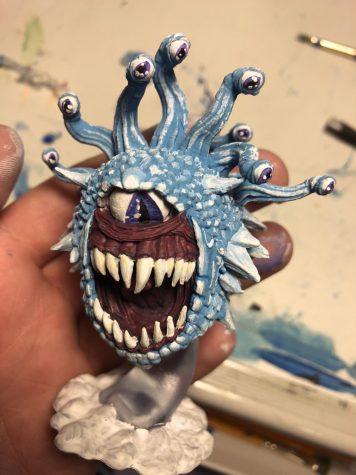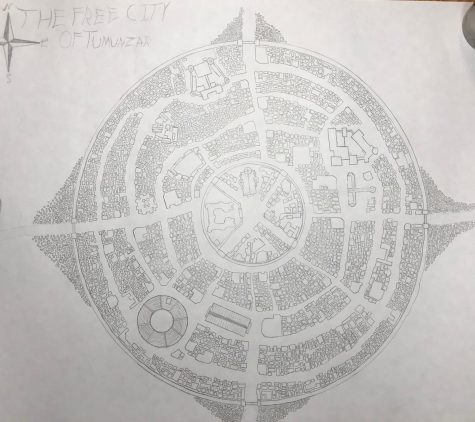More Than Just a Game
Why you should give D&D a chance
Official cover art of “Tales From The Yawning Portal”, A recent book published by Wizards of The Coast
September 27, 2018
When most people hear or think of “Dungeons and Dragons”, they’ll likely think of a group of teenage, acne-ridden nerds huddled around a table, playing an imagination game to escape the existential crisis that is their high school life. They might also think of the 1980s moral panic in which the game seemed to be linked to suicide and Satanism. However, they might not have thought of a limitless canvas in which anyone can enjoy, learn lifelong skills, and have experiences that they’ll never forget. But, what really is Dungeons and Dragons?
Dungeons and Dragons was created by Gary Gygax and Dave Arneson and published 1974. The game’s foundation was originally conceptualized from “miniature-based wargames”, a tactical simulation game originally invented in 19th century Prussia to practice military tactics. In playing the game, Gygax began to imagine the possible motives and feelings of the soldiers. Who are these people? Why are they fighting? Soon, instead of telling a battle, he began to tell a story. And this is only just the beginning of everything that’s possible with D&D.

Your Adventure, Your Rules
See, Dungeons and Dragons can be just a game. You can sit down, roll some dice, play a character, and leave. And that’s totally okay, the whole point of D&D is to play the way you want to. The thing is, it’s capable of so much more. Instead of a simple time-passer or get-together, you can learn life skills from the game. The nature of the game makes it perfect for finding creative solutions to problems and rewarding for it. As someone who runs these games for players, I couldn’t tell you how many times I’ve had to improvise the game because the players bypassed things I never expected them to. The freedom that the game provides fosters creativity, problem-solving, and it encourages engagement. Everyone plays a part in something greater, whether that’s finding the perfect way to take down the dragon that’s waiting in the next room, or helping an old lady find her cat.
Due to the devilishly simple rule of the game, you can adapt it to almost anything. Sick of fantasy and want to try something sci-fi or even modern? All you need to do is change the names of certain things, and you’re practically done. Your only limit is imagination, and it’s a good thing that it’s limitless.
What’s In It for Me?
So, why should you play D&D? Well, for one, if you’re already a fan of role-playing video games, such as the Fallout or Witcher series, there’s no doubt that you’ll enjoy Dungeons and Dragons. Not only do these video games derive their roots from it, but D&D has everything that those games have that makes them great without restrictions that come from coding or budgets or anything else like that. It is one of the few, at least in my opinion, true role-playing experiences that you can have. But even if you aren’t a video game fan, there is still reason to play. The open-ended gameplay of D&D means that you can live out whatever fantasy you want, and do things that you normally wouldn’t be able to do in real life. If you want to explore the lifestyle of a pirate on the high seas, you can. If you want to become a virtuous knight, dedicated to protecting those who can’t protect themselves, go for it! If you want to be some homeless person dead set on murdering everyone he sees, I guess you could do that, but I’d recommend seeing a psychologist while you’re at it. The possibilities are endless, with countless combinations of races, classes, and backstories, you can be whoever you want.
Lifelong Lessons
Maybe you aren’t a video game player, and the idea of roleplaying doesn’t appeal to you. Well, there are still aspects of the game that you can enjoy, and learn from. Playing the game, you’ll develop teamwork skills as you solve puzzles or problems. You learn that everyone plays a part of a greater machine. In the context of sports such as football, the training and tactics such as the positioning of your players could mean the difference between a win or a loss. The same applies in D&D, where you similarly learn what people can and can’t do on their own, and what they can do together. Everyone has a chance to shine. Creativity and encouragement are rewarded, and the randomness of dice rolls keep the game interesting.
Carte Blanche
If you like to create and write stories, then the game has a place for you. As Dungeon Master, or DM, you are in charge of presenting the world and it’s stories to your players, guiding them through the adventure. I DM games for players, and I honestly prefer it over playing. Not only do I get to build an entire world from the ground up, filling it with places and people, but I also get to explore political and philosophical topics in my world, ultimately making it feel more real. If the task of worldbuilding is too daunting for an aspiring DM, then there are plenty of official pre-made adventures, or “modules” to use, as well as tons upon tons of fan-made content, usually referred to as “homebrew material”.

Better Together
It’s also something different that you can do together with friends! You can bond even closer, create inside jokes, and even meet new friends. I’ve made memories with my players that I’ll likely remember as long as I live. Ultimately, Dungeons & Dragons is more than just a game. It’s an experience, a canvas for creative freedom. Anyone can find something to like about it, and everyone can shine, both in and outside of the game. It’s something that everyone should try at least once, because it doesn’t hurt to try, and you might find that a simple pastime can turn into an engaging and amazing experience.
“Why Do You Play D&D?”
“I play it because I want to distract myself from life’s stress. It’s also a fun way to get together with a group of friends and have fun getting immersed in the game’s world, depending on how good the DM is. I also get free reign on doing stupid stuff to solve problems if I want to.” – Addison Foley, graduated
“There’s something you just can’t beat about turning a guy’s face into a cereal bowl.” – Noah Johnson, graduated
“I play because I enjoy the imagination and problem-solving elements of the game itself, as well as how open the gameplay can be. Literally, anything can happen if you roll the dice just right, causing either mass chaos or exhilarating victory. Dungeons & Dragons is also a great way to interact with peers and express one’s imagination through storytelling and problem-solving. Overall, it’s a great time and no session is ever the same!” – Lauren Smiley, graduated
So what are you waiting for? Endless worlds of possibilities await your very fingertips! Get out there and play!
If you are interested in playing D&D, I recommend that you check out the basic rules for the game, available for free here: http://dnd.wizards.com/articles/features/basicrules After that, it’s as simple as finding some friends to play with!


